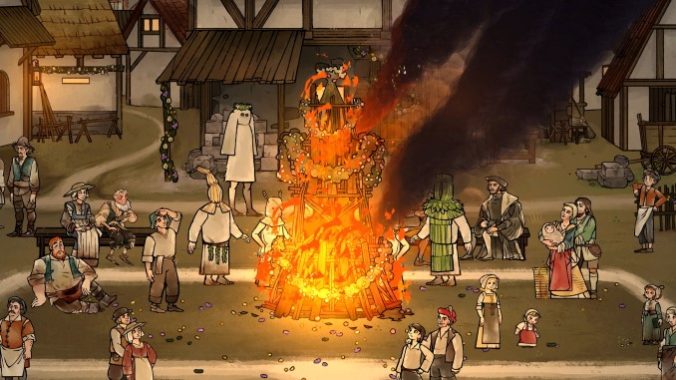Pentiment is out on Switch and PlayStation now, and dear god, you have to play it. You gotta. I’m practically begging you. Look, I know a few other people have written pieces like this and there may be someone in your Discord DMs right now urging you to give it a shot. Hell, I’m a little goddamn late to the party! If you do not listen to your annoying friend, listen to me, or I swear we will both haunt you like the lingering afterimage of an old painting.
It is easy, and not unjustified, to make a lot of Pentiment‘s literary ambitions. One can play Pentiment, as I did a bit, as seasoned developer Josh Sawyer taking the weights off, Rock-Lee-style. You don’t have to worry about shit like VATS or turn order here, we can get right to the good stuff: 16th century theological debates and nuns scolding you for not thinking about the consequences. The credits have a bibliography for god’s sake! This game is basically a book.
The truth is though, that Pentiment is just as engaged with Final Fantasy as it is with Name of The Rose, Pathologic 2 as much as Cadfael. Pentiment‘s structures are distinctly videogamey: Daily schedules, moral choices, evidence gathered in a quest log. Past choices determine future dialogue options, enable you to persuade characters, and open potential murderers for you to accuse. You have to walk places, get to know geography, find hidden crevasses and secret places. Most fundamentally, Pentiment is about watching text scroll across a box, a tried and true method of videogame storytelling.
When I previewed the game for Paste back in 2022, I made much of the game’s usage of fonts, the way the letters draw themselves or press onto the screen. Pentiment is “alive,” a living illustration, the sound of quills fading in, scratching on the paper that is written in front of you. The game is also “dead,” mimicking long vanished art forms, ancient calligraphies, and faded pigments. I think of that contradiction often. Much about Pentiment would be just as powerful in any other medium, but that particular contradiction, between a living text and a dying movement, is unique to this one.
The basic beats of Pentiment‘s plot are not negotiable. Pentiment is perhaps the best game I’ve played at making each choice interpretive, rather than powerful. What do these events mean? This boils down mostly cleanly to “who did the murder?” which is much more directly political than factual. When all of the suspects could have plausibly committed the murder, who do you want to have done it? But protagonist Andreas’ education and experience equally shape interpretive possibilities. A theologian and a naturalist (or both) have different feelings about the world and what it is about. Pentiment‘s final set of choices is purely interpretive, choosing what events from the town’s past to depict in a mural. It asks simply what you want to be true and what truth you want to last.
Most fundamentally, those questions mean that Pentiment sticks in your fucking brain. It is as powerful in memory as it is in play. It’s a story you can have real debates over. It’s so easy, pleasurable, and melancholy to turn over in your mind, to feel the contours of, to cut your hands on its pages, to feel it worn and yellow like an old family bible.
I can’t speak to what it was like to be a faithful peasant or clergy in 16th century Bavaria, but to my limited experience, Pentiment nails the simple friction of religious communities. The tension between the clergy of the abbey and the peasantry of the town is class-driven as much as it is religious. These debates will spill out in terror and blood. But still, we are all one flesh. There is immense harm that must be forgiven because they are the ones who will buy your grain, because your family home is here, because she is your neighbor, what else can you do? There is a simple beauty in that, no question. But it is not quite forgiveness, but more necessity. We are poor and small, and do not have the power to smite those who wrong us except in simple rage that will not last the morning.
It is that smallness that makes Pentiment so powerful. Andraes’ limited agency is mostly created from his profession and education. It is arbitrary. Pentiment will humble both him and you. Still, there is something left behind. Invisible marks on parchment, the colors of some old composition, the letters seeping through, subtext made plain. The dance of death is eternal, but we step in different ways. Through countless dances the earth erodes, until those steps cannot be forgotten. Pentiment is a game about that modest eternity, the things that we leave behind after all else is forgotten. And sweet lord, you all need to play it.
Grace Benfell is a queer woman, critic, and aspiring fan fiction author. She writes on her blog Grace in the Machine and can be found @grace_machine on Twitter.
